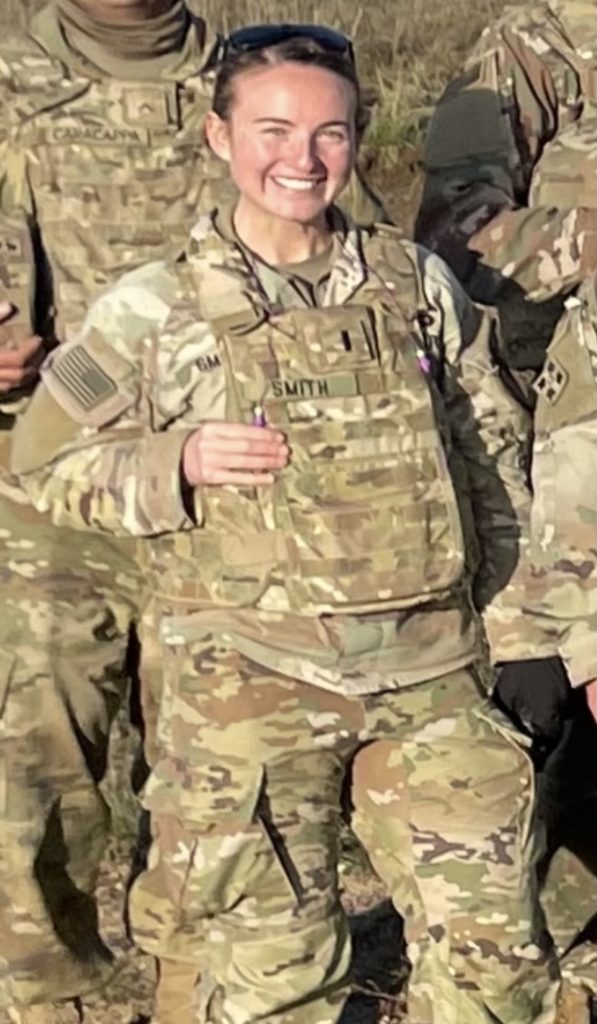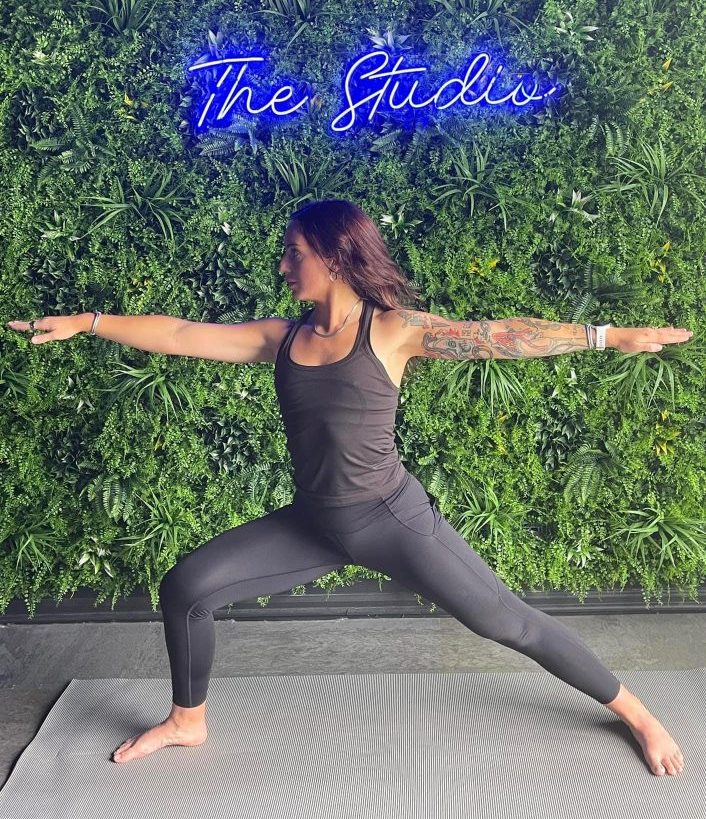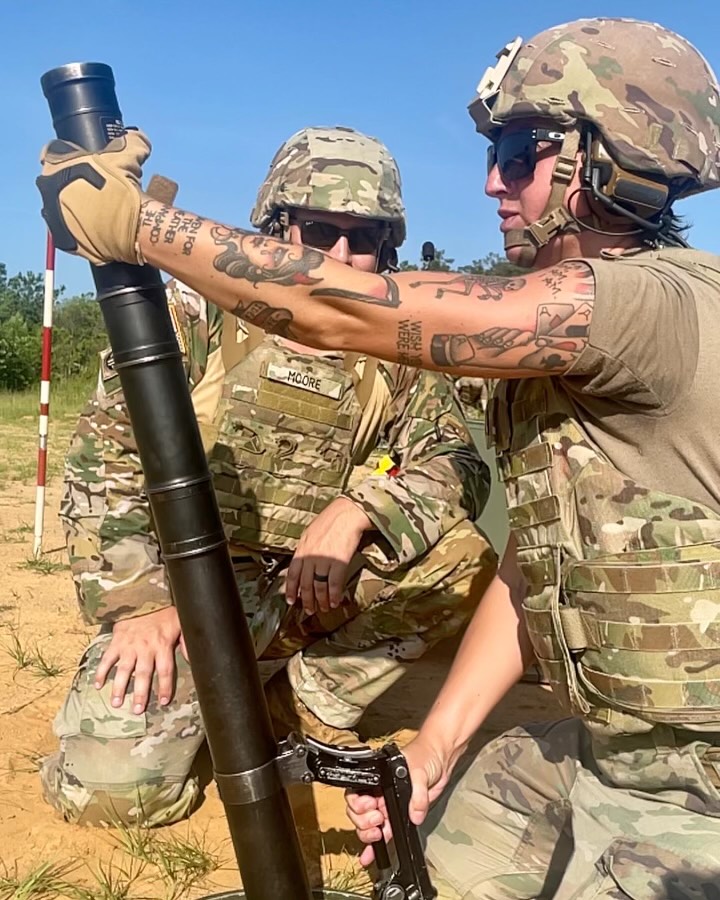They told her to stick to Girl Scouts, but Annika Rustad had other plans.
Not only was she one of the very first women to join the U.S. Army as an officer in the combat arms branch, but she earned her 200-hour yoga certification while serving in Eastern Europe, living in a tent with 60 men.
Now, she’s bringing her powerful yoga and mindfulness practice to the Coronado Fitness Club. In addition to her weekly Sunday classes, she’s offering a free yoga class to celebrate Veterans Day. All community members are invited to attend the hour-long yoga flow on Saturday, November 9 at 9 am.
Rustad says that practicing yoga and mindfulness helped her recover from not one—but two—traumatic brain injuries she suffered while serving in the army.
As if being one of the very first women in the infantry wasn’t challenging enough.
“I wasn’t trying to be a trailblazer…that was never my intent,” said Rustad. “But that’s how it happened.”
Rustad says she was inspired by her brother who graduated from West Point and commissioned to be an infantry officer in 2015. The very next year, the U.S. Army opened up combat arms to women.
“I was like, if he can do it, I can do it,” said Rustad.
After graduating Point Loma Nazarene in 2019—the first woman to commission as an officer in the infantry from the San Diego-based ROTC program—she reported for training as a second lieutenant. She was sent to Ft. Moore, Georgia to complete 18 weeks of training. She was one of eight women in a class of 208.
“It was brutal,” she said.
In addition to many other challenging exercises that tested both men and women, all trainees were required to “ruck” for miles in the woods while wearing a 50-pound backpack. (With water, the packs weighed more like 80 pounds.) Rustad says that, at the time, all the equipment and body armor was designed for men, and the women just had to make do with what they had. In addition, the obstacle courses were more suited for a larger frame.
At 5-foot-three, it was a challenge. But she kept pushing on.
“You have to learn how to modify,” she said. “If I’m having a hard time pulling a 200-pound dummy out of a Humvee, I know I need to deadlift more and I need to get my grip strength up. You just kind of learn.”
But she says the hardest part is that, while her male trainees were kind and supportive, her superiors made it known that women weren’t welcome in the infantry. Although she and her fellow female trainees completed every single exercise the men did, they weren’t even allowed to celebrate the end of their training with the men.
“Everyone had been in the field for five days, so you’re already exhausted,” said Rustad. “You’re in formation, and you have your weapon and helmet and gear. You get to this compound in the woods and it’s “the Gate to the Infantry” and you’ve made it through. It’s a big deal.”
But the women were pulled out of the line and weren’t allowed to pass through the gates and receive their blue cords, designating them as officers of the infantry.
“They told us to sit on our rucks and watch the men go through,” she said. “Later we went back into the training building, and the women went in, and they kind of threw our blue cords at us.”
While she says that today the idea of women serving in combat is much more normalized, she and her fellow women graduates faced constant push-back.
“You don’t make the news anymore,” she said. “But when we went through, we got posted on social media, and then torn apart and cyber-bullied by grown men telling us to stick to Girl Scouts. They said they’d never be caught dead following us in combat.”
Things didn’t improve much when she got stationed at Fort Hood, which is now Fort Cavazos. At the time, the Army post was reeling in the aftermath of the 2020 murder of Vanessa Guillen, who was killed by another solider. Ft. Hood also struggled with a reputation for being a hotbed of sexual harassment.
Rustad experienced this first-hand, but if she reported the sexual harassment she was labeled a troublemaker.

Then came the first of two traumatic brain injuries that changed her life forever.
The first happened in Ranger School in January of 2022. Rusted says she fell wearing her ruck with 60 pounds of gear, and was found face-down pinned under her equipment, unresponsive on the side of the road. After 23 minutes of CPR and intubation, she emerged from the Intensive Care Unit with a traumatic brain energy.
Rustad was scheduled to deploy four months later to Eastern Europe, so she was sent on six weeks of convalescent leave to “figure things out.” She moved back in with her dad in San Antonio, Texas, where Rustad struggled to perform basic tasks like reading and driving.
She says her dad helped her get back into the rhythm of reading again, printing off a simple recipe every night. They would cook together, sometimes something as basic as Rice Krispies Treats. Gradually things started to come together.
“I wanted to deploy…my reading level was back up, and I was kind of managing the symptoms, so I thought, let’s go,” she said.
But while overseas on the border of Belarus, she suffered another traumatic brain injury. She regressed back to her previous condition, suffering intense anxiety and depression while living in a tent in the middle of the woods with 60 soldiers, all men.
“I knew I had to figure out a different way to get better,” she said. “I had been doing yoga for ten years at that point, and I have always wanted to get certified and be able to teach. So that’s what I did.”
Rustad started the 200 hour program which forced her to practice yoga every day. She says it’s the best thing she could have done.
“I was meditating every day, practicing mindfulness every day, and practicing yoga every day, which is what helped me get through the crazy symptoms I was having,” said Rustad.
Then came the part of the certification process where she had to teach. She asked the soldiers living in the tent to take one yoga class per day with her. As the highest-ranking officer at her post, it was their duty to comply.
At first, they complained. They wanted to lift weights and they wanted to go for runs.
“They didn’t want to do yoga,” she said. “It was girl stuff. But I was just like, you have no other option. We’re going do this and have fun. And eventually, they stopped grumbling.”
After a while, men would start coming in to take yoga from other tents. They started asking her questions about yoga. Then, she started to notice that some of the guys were practicing yoga on their own. What started as something to address her own issues started to have a real effect on the people around her, who were also struggling in the tumultuous environment.
“You’d see them sitting, practicing mindfulness by their beds, and it was the most rewarding thing,” she said. “And I realized, that’s what this is all about. This is it!”
She noticed a subtle, then major change in the environment inside her tent.
“Everyone was more tolerable to be around,” she said. “Everyone had a better attitude. They seemed to be more mindful when it comes to little things, because I think they were feeling better.”
As Rustad starting gaining confidence as a teacher, she realized that it was her true passion.
“It was amazing to see the benefits of teaching,” she said. “Once I saw how much it can change the environment around you, and get that positive feedback, I was hooked.”
Rustad acknowledges that she will never fully recover from her injuries, but that’s okay.
“Sometimes, you’re never going to be the same person again,” she said. “And you kind of have to forgive yourself for that. But you need to step back in gratitude and look at the big picture.”
These days, in addition to teaching yoga at Coronado Fitness Club, Rustad spends her time working with first responders and other people in stressful positions, helping them learn mindfulness and resilience. She realized it was a need when her husband, who is in the Navy, was undergoing some stressful training.
“I realized there was a need for this in the special operations community because there were no resources for him at work,” she said. “And I started hearing more chirpings from people in need, and realized there was an overwhelming desire and need for mindfulness in these really high-stress, high-achieving environments.”
So she started her company, Siren Wellness, which teaches yoga, mindfulness, meditation, stress management, resiliency and optimization. She works all over the country, with everyone from firefighters and police officers to first responders, operators, even business owners who just want that extra 1% improvement. The biggest surprise? How accessible all these strategies are.
“It’s a hidden gem,” she said. “Resilience is a muscle, you have to practice, you have to work on it.”
Rustad says she will always feel connected to the armed services and is dedicated to continue serving them. Her husband is active duty, both her parents were Navy, and her brother is veteran.
“And there’s an epidemic in the armed services right now, a mental health crisis, whether you’re in or whether you’re out,” she said.
At the end of the day, that’s what it’s all about. All of the yoga, all of the mindfulness, and knowing that you could make a difference.
“If helping someone take a mindful moment gives someone a second chance, I’ll do whatever it takes to provide that,” she said.
Community members are invited to call Coronado Fitness Club at 619-522-9200 to get on the list for the free Veterans Day class on Saturday, November 9 at 9 am. Space is limited.







Loved this article! My daughter was a Girl Scout, which teaches strength, resilience, kindness and perseverance.
It appears that Annika continued on that path, and that path is indeed an impressive one.
Beautiful article about a woman who challenged the status quo, kept fighting through injuries and decided to give back. She was sticking to being a Girl Scout because girls can do anything they set their mind to. So proud of all the trailblazers being role models for women and men everywhere.
Thank you, Christine, for this phenomenal article about Ms. Rustad and her perseverance through sexism, misogyny, harassment by her superiors, and physical injuries. While the men who told her to “stick to Girl Scouts” intended it as an insult, they couldn’t have been more wrong. She embodies all the best qualities of the Girl Scouts. As a former Girl Scout myself, I hope Ms Rustad is invited to speak to our local GS troops!
I am so glad to learn of Annika Rudstad through this writer. As a Girl Scout and Coronado GS leader for eleven years in Coronado, I know we prepared girls to push past obstacles-including mysogyny and trolls- to meet goals and to support community. I appreciate meeting women who overcome challenges and press on in the face of adversity, who like Rudstad show those core GS values of courage, character and confidence. Whether she learned to persevere in scouting, from family, in a sport or elsewhere, it’s clear the author showed us she is an overcomer to be recognized for her spirit and for giving back to her brothers and sisters in arms.
This is a wonderful, well-written story about an inspiring and resilient leader. Anyone finding fault with how it opens obviously has some weird, free-floating grievance that looks to attach itself to something. Lighten up, Francises.
Hi, Ken. Your comment is part of the problem. By minimizing Girl Scouts to a nothing endeavor that girls do to occupy themselves, as opposed to a program where girls learn to develop real-life skills including outdoor, STEM, leadership, and entrepreneurship, you are complacent in a system that boils down girls and women and the programs that serve them as meaningless time-occupiers and driving girls away from engaging in them. Imagine if this article had so flippantly referenced Boy Scouts – (“They told Bill Gates to stick to Boy Scouts, but he had other plans.”) would your sentiment be the same? Well, no, because people recognize the Boy Scouts for the good it does and its importance, but when the first word in front of “Scouts” is “Girls,” suddenly it’s just fine to boil it down to a nothing time-waster and erase the role it probably had in creating such resilience and leadership skills in Rustad.
Thank you for such an inspiring story. I love that she took what was probably meant as an insult and embraced it and showed them. Whether she was in Girl Scouts or not, I’m sure she serves as a role model and inspiration to all girls who meet her. Annika has had to persevere through sexism and misogyny and she is showing girls they can do the same.
What a wonderful article! My daughter was a Girl Scout. The program laid an amazing foundation for her life. Whoever said this to Annika Rustad, obviously intended it to diminish her. But they didn’t understand the power of Girl Scouting! One of the things that I loved most about the program was the encouragement to dream about the future. Girl Scouts are encouraged to use their voice and their power to change the world – which is so clearly what Annika is working to do. I am deeply moved by her dedication to veterans. I don’t know if she was ever a Girl Scout, but she quite clearly embodies Girl Scout virtues. Thank you for highlighting her story.
100% agree. Thanks Charlette for your always inspiring words.
I am a current Girl Scout mom and volunteer. I am not remotely offended by the opening line of this inspiring story. This was a comment made to Rudstad and it is part of her story and the gender discrimination she faced. If she was a Girl Scout – I hope she comes and speaks to our girls. I’m grateful for past and present Girl Scouts and Volunteers who lead our community. I’m also grateful to Rudstad for sharing her story and being a source of inspiration for girls.
Great article. Don’t see how Annika’s sharing of her transformation should hurt anyone. Thanks for this thorough and inspiring story!
Thanks for this wonderful story! It’s an inspiration for all young women.
Ridiculous comments about Girl Scouts- I thought the author wrote a wonderful article about one badass girl who I hope to meet one day – I found it very inspirational and no disrespect to the Girl Scouts.
I am not a fan of Christine’s biased reporting, but this one is one of the worst because she looking down her nose at the Girl Scouts, an organization that helps young women reach their full potential by teaching them life skills that they will use forever.
I know several women who credit the Girl Scouts for giving them the confidence that they can achieve whatever they want to in life. That’s so important.
Any program that helps young people develop confidence, self-reliance, teamwork, and camaraderie should be lauded.
To the author: I am disappointed to learn that you have blocked me from seeing your posts on 2.0. A free press is not free when authors censor what citizens are allowed to see.
It is a free press in that you are able to see it and read it, as per your comment. As for social media anyone can block anyone. That is also a first amendment right. Two different things. Same originating principle.
Taking offense to a single line about Girl Scouts in a 4:14 am post says it all, bro.
This is a disappointment opening line to an otherwise inspiring story about a strong and resilient female. I’m surprised that an author, who should certainly understand the challenges today’s women face, would promote such a sentiment. Please consider how your words affect community mindset before printing in the future. We have lots of hurt Girl Scouts and volunteers today and will be discussing this article and our response at the Coronado Girl Scouts Service Unit Meeting tomorrow along with representatives from Girl Scouts San Diego. Coronado Times, you can do so much better than this. We would be interested in writing our own article to give a glimpse into all our Girl Scouts are working on to make our community a better place and how these experiences will help them become tomorrow’s challengers and change-makers.
Please don’t teach childrne to be “hurt” by every little thing. It’s just more of the grievance culture. Teach them about Annika. Reinforce the truth that nowadays, thanks to the support of friends, family and community, even a community as strong as the Girl Scouts, they can now do whatever they set their sights on. And thank you for serving these young brilliant people.